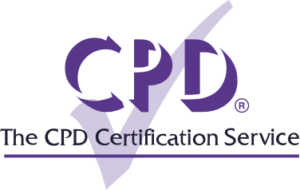In this Health and Safety Officers CPD Guide
Why do Health and Safety Officers need CPD?

Health and safety officers need to comply with Continuing Professional Development (CPD) to stay up to date with the latest health and safety regulations and best practices. By completing CPD training, health and safety officers can ensure that they are aware of any changes in their field, as well as any new technologies, techniques or legislative updates that can help them better fulfil their roles in protecting the health and safety of their colleagues and the public. CPD training also helps health and safety officers maintain their professional qualifications and continue to build their knowledge and skills in their field.
What our customers have to say
Dan King
Mobilisation, Training & Performance Manager

Sophie Aiken
HR Manager

Harriet Lee
Retail Recruitment Manager

What CPD courses do Health and Safety Officers need?
In the UK, a health and safety officer needs to comply with a number of regulations to promote the safety of their workplace and keep abreast of relevant changes and updates.
Some of these include:
- Health and Safety at Work etc Act 1974.
- Management of Health and Safety at Work Regulations 1999.
- Control of Substances Hazardous to Health Regulations 2002.
- Reporting of Injuries, Diseases and Dangerous Occurrences Regulations 2013.
- Fire Safety Order 2005.
- The Royal Society for the Prevention of Accidents (ROSPA). ROSPA provides guidelines and recommendations to help health and safety officers stay up to date with best practices and regulations. Knowing and understanding ROSPA helps identify potential risks or hazards that may arise in the workplace and take steps to prevent them before they become an issue. Ultimately, understanding ROSPA helps health and safety officers to protect the wellbeing of everyone in the workplace.
The pieces of legislation and regulations above are covered in a number of the CPD Online College courses which can help you to meet your CPD requirements.
Some courses that we suggest for a health and safety officer include:
- RIDDOR (Reporting of Injuries, Diseases, and Dangerous Occurrences) Awareness – this covers what needs to be reported relating to injuries, diseases and dangerous occurrences. It includes when a RIDDOR report should be made and how it should be recorded.
- Workplace First Aid – this course covers an introduction to first aid, and how to administer CPR. It includes how injuries should be treated in the workplace as well as some common illnesses that employees may experience. As a health and safety officer, it will also teach you how to record these.
- Manual Handling – this course will provide knowledge on how to reduce the risk of accidents from manual handling in the workplace. It teaches the basics of correctly moving and handling objects including lifting, pushing and pulling.
- Fire Safety Awareness – this course gives knowledge on how to reduce the risk of, and how to respond to reports of, a fire in the workplace. The course also acts as a base for becoming a designated fire warden.
- Office Health and Safety – this course will highlight positive and negative health and safety management and the implications that it has on the business. It will also include Employers’ Liability Insurance which is legally required under the Employers Liability (Compulsory Insurance) Act 1969. It also covers the legal requirements of other relevant health and safety legislation.
The list above is just some of the CPD training courses that we offer at CPD Online College. Our full range of courses suitable for a health and safety officer can be found on the courses section of our website.
Download our CPD trackerA guide to CPD for Health and Safety Officers
The Health and Safety Executive (HSE) is an independent body responsible for promoting and protecting people’s health and safety at work in the UK. They provide information and advice to employers and employees, as well as helping to enforce health and safety laws. They also investigate serious workplace incidents and prosecute those responsible if necessary.
According to a report by the HSE, there were over 6,600 workplace injuries related to the failure of health and safety measures in 2019. These incidents accounted for around 10% of all reported workplace accidents that year. It is important to note that these statistics only relate to reported incidents and the actual figure could be higher. The HSE also found that around 50% of reported incidents were due to a lack of knowledge or training around health and safety procedures. This shows that health and safety officers have a vital role to play in keeping workers safe, and that more needs to be done to ensure that everyone is aware of the procedures in place. This can be done through Continuing Professional Development.
CPD certificates
A CPD certificate is a document that verifies that you have completed a continuing professional development course. It provides evidence of CPD training, giving employers and other stakeholders assurance that you have maintained and developed professional skills and knowledge. CPD certificates are a great way for you to demonstrate your commitment to the industry.
You can obtain a CPD certificate by completing any of our CPD training courses. All of our courses can be accessed online for you to complete in your own time with no time limit. However, we do advise that you complete your chosen CPD courses soon after you commence them for a greater chance of passing the end of course quiz. We have a quiz at the end of each course to test your knowledge and understanding of the course content to help embed the new knowledge into your brain. From experience and feedback, we find that there is a greater first-time pass rate for those who complete their courses in a timely manner. Although, if you do fail the end of course quiz you will have the option of going back through the course materials and retaking the quiz. If you need any assistance with our course access or course content, we do have staff available online who can help you.
Your certificate can be accessed via website download, or we can send a hard copy to you in the post. CPD Online College certificates are professional and fully regulated so you can be assured that you will have the relevant accreditation for your field. You can use them for evidence that you have completed some CPD training for your industry. This can be particularly useful when proving how you meet certain regulations and requirements (such as those included in the HSE and ROSPA).
Logging CPD hours
We advise CPD Online College students to keep a personal CPD log to monitor the time that they spend on CPD training. Some industries ask for a certain number of hours of CPD training to be completed each year, so this is a helpful way of tracking all of the work that you’re doing. As well as logging the time that you spend on CPD online courses, you can also include time spent on other CPD activities such as webinars, conferences, job shadowing, research, and with mentors. A combination of CPD activities all count towards your CPD training goals.
Keeping evidence
Keeping a record of your CPD training is an essential part of ensuring that you are up to date with the latest industry standards and knowledge. The best ways of keeping evidence of your CPD training are to keep a log of the courses you have taken and the certificates you have received, and to create a portfolio of your work that demonstrates your current skills and knowledge. Additionally, it is important to keep notes of any conferences or seminars that you attend, and any additional reading or research that you carry out. Keeping a record of your CPD training will help you to stay up to date with best practice and industry trends.
CPD is not a one-off activity, it is a continuous process of learning to ensure that you stay up to date with the latest regulations, guidance and best practice in your industry. Often, rules and regulations will be reviewed and updated in line with scheduled reviews and learning from negative situations. It helps to ensure that you are meeting any requirements of your professional body, such as the need to demonstrate the highest level of competence. Ultimately, keeping your CPD up to date helps you to remain a knowledgeable, competent and effective professional. Most industries ask for a renewal of your CPD certificates every two years. This can be done by taking refresher courses (which we provide on our website) or taking the higher level of your course subject. You can use your own records of your CPD training to ensure that you are aware of when your certificate renewals are due.
Renewing CPD certificates
It is recommended that you renew your CPD certificate every two years. However, your employer may want you to complete a refresher every year. This will depend on the rules within your company.
Refresher training also counts towards your CPD. Therefore, you can log CPD hours for every course you undertake, including those taken as a refresher.
























